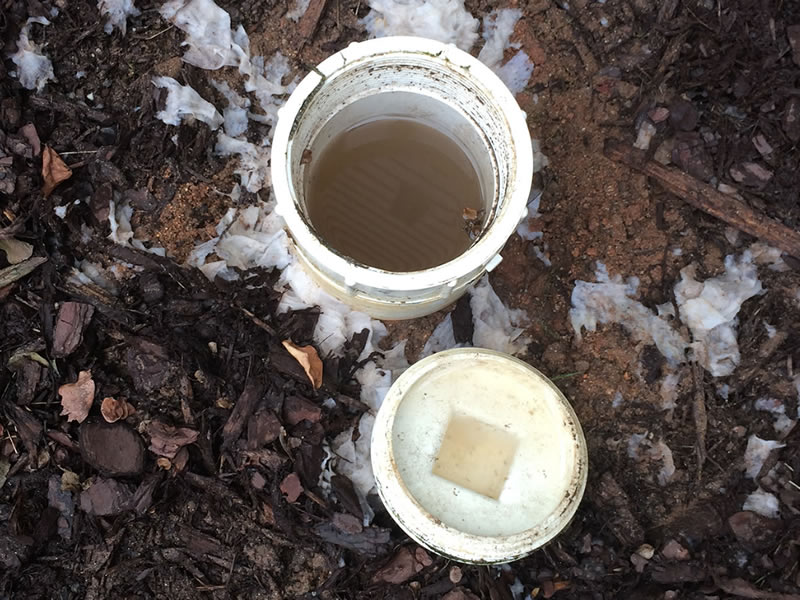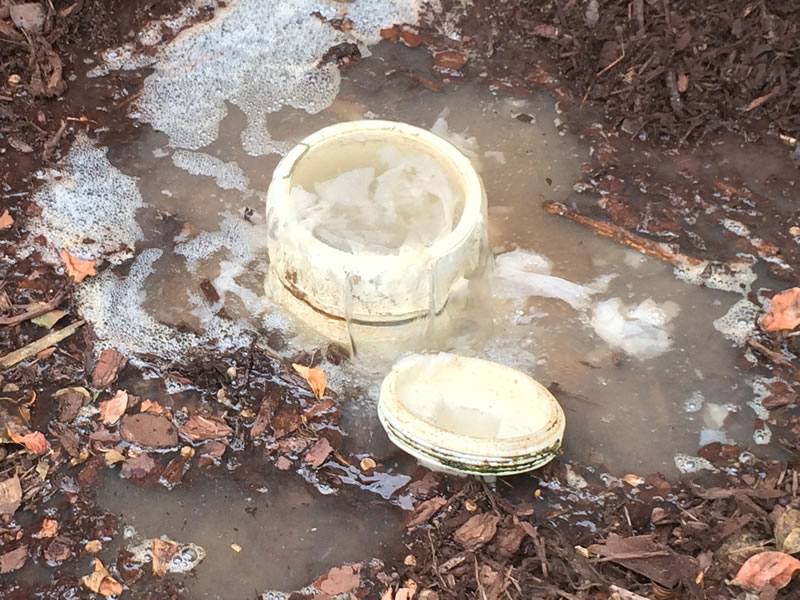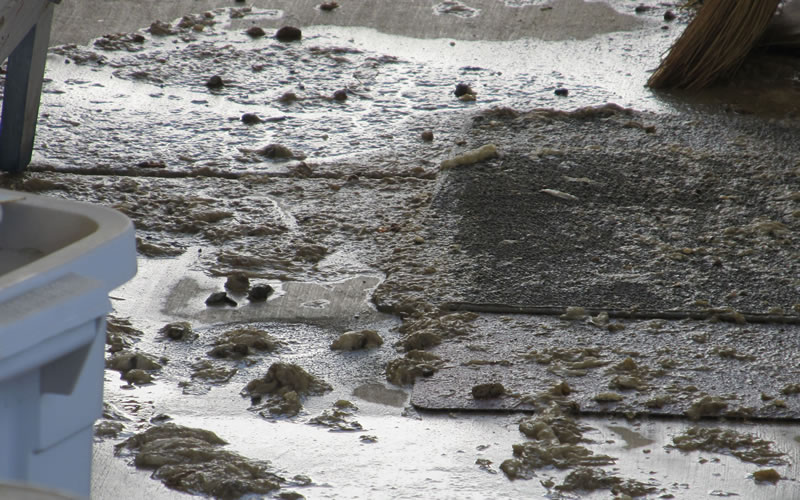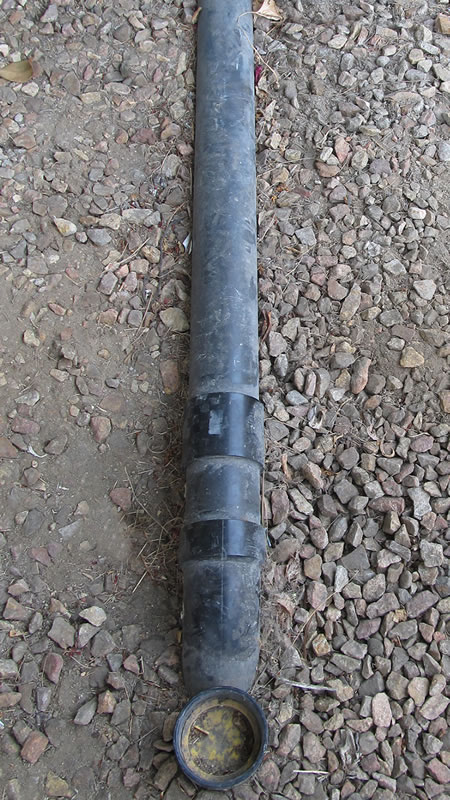Mobile Home Owner Tips
Mobile Home Park Sewage Spills
Attention: If there is a sewage spill in progress or very recent, skip to Urgent Steps for a Sewage Spill in Progress for helpful instructions to assist in solving the problem.
Overview and Commentary
This is not a pleasant topic. But if you live in a mobile home park and the age of the park and the maintenance are questionable, you may thank yourself for knowing about these suggested procedures. To be fair, sewage problems are not just the domain of mobile home parks and the presence of a spill does not immediately indicate the park is poorly managed. But if your park's owner is not spending much money on park maintenance, your chances of encountering a spill may increase.
A sewage spill is when sewage escapes from the sewage pipes or sewer system into the open air and flows from around the spill area.
These procedures are particularly suitable for an HOA officer or committee person, but all residents of mobile home parks should be aware of this issue.
Ensure Your Safety
Get Trained, Certified and Licensed Professionals Involved
Too often, in poorly funded mobile home parks, the park employees may attempt to manage and remediate urgent matters by themselves, even when these issues are emergencies and seriously affect the ongoing health and safety of park residents. This is not a criticism of park employees for being concerned or involved in emergencies. This is an issue of having properly trained and licensed professionals on the scene during those emergencies. Residents have a right to be concerned about the quality and thoroughness of the work performed by inexperienced park employees. Additionally, untrained individuals may not know how to appraise an emergency and may overlook items that professionals are trained to find. Some matters are best left to professionals.
Where mobile home park employees can make the greatest impact is to manage the park for prevention of serious problems. For example, check your park’s newsletter and flyers for repeated strong reminders to residents to follow park rules for usage of sinks and toilets (avoid flushing diapers and the like down the toilets, avoid using sinks for grease disposal and the like). The park employees must monitor and maintain sewage lines and pumps. New residents should be informed in writing to not abuse their drains and toilets. That is where park employees are best assigned, not as HazMat crews to handle contamination emergencies. Park residents may find that they need to be witnesses, to be involved with oversight of emergencies so that these urgent matters are handled in the safest way. Residents have a right to ensure community health and safety and to keep records for use when promoting improvements.
Three Categories of Sewage Spills
In mobile home parks, sewage spills can informally be put into three categories.
1. Lower Risk Level
Spills inside the mobile home, typically the overflowing of sink drains or toilets.
These are typically the responsibility – though not necessarily the fault – of the mobile home owner. The home owner must call a plumber, at his own expense, and have that professional determine the reason for the spill. If the cause is due to the park's infrastructure failure or clog, then the homeowner can seek to be repaid for the costs and damage. Usually, a competent plumber will be able to assess where the problem originated. Be sure to get this appraisal in writing with the time, date, and the name of the professional doing the appraising. It is crucial to use licensed, trained and certified professionals for this work in order to present a strong case in the event that compensation is due the homeowner.
If the sewage spill is contained within a mobile home, not reaching the outside, then the most danger of health and safety is to the residents within the home, and much less so to neighboring homes. The building may be weakened by contact with moisture and should be examined by a professional. Loss of the home may result due to mold or water damage if not given immediate professional attention. Additionally, mold damage may be the only legal reason that a park owner can demand entrance into a home. If damage is visible from the outside and the park owner requests to inspect the home, you may be compelled to allow them entrance. You can prevent this by immediately attending to any spills inside the home and by hiring professionals and having them give you a report that you can present as proof of your efforts to solve the problem.
2. Medium Risk Level
Spills outside the mobile home, on the homeowner’s lot.
These are spills that originate from the sewage connection to the home or the rented lot's own cleanout plugs or plumbing. Mobile homes typically have a large removable plug on a pipe joint fitting near the home. This is for performing cleanouts of the home owner’s sewage pipes. The main difference from the above Lower Risk Level 1 is that the sewage is leaking outside the home and usually reaching the ground and flowing. If the spill is obviously coming from pipes extending from the home, it is the home owner's responsibility, but not necessarily the home owner’s fault. Weak or failing hookups may be to blame.
If a sewage spill touches or flows underneath a structure such as a storage shed or mobile home, then there is an issue of health and safety and a competent professional, hired by the resident, may be the most reliable source of advice.
As with the internal spill first discussed, the resident should immediately call a certified plumber and insist that professionals make every attempt to stop the spill and minimize the damage. A responsible mobile home owner should attempt to notify the mobile home park manager immediately and notify owners and occupants of surrounding mobile homes and buildings, if threatened, so that they can move their possessions and attempt to reduce potential damage.
The home owner may be liable for damages if the spill extends beyond their lot and was due to their own lack of inspection and maintenance of the home. Even if sewage does not flow beyond the lot, there is the issue of soil contamination and, once the ground dries, the possibility of windswept dust and debris affecting neighboring homes and communities. If rain or irrigation reaches the affected area, it may carry contaminants off of the lot and onto neighboring lots or streets. A home owner may be liable for health and safety issues arising long after the sewage spill occurred.
Be sure to obtain a written report from all involved professionals that attend to the sewage spill. Document whether the sewage spill is the fault of the homeowner or of the mobile home park owner’s plumbing. A trained and certified professional knows the laws and issues concerning health and safety and can advise the resident on how to reduce liability for future damages. You may need to insist that a report be filed and that you be given a copy. All professionals and public employees should make a written report explaining their estimated cause of the sewage spill. Tell them when you are speaking to them that a report is expected and ask when you can obtain a copy. This can be a crucial item to have if negligence is suspected.
3. Highest Risk Level
Spills originating from the mobile home park’s own infrastructure.
These are spills that occur outside the mobile homes and cannot be associated with any particular home. These spills typically occur at a cleanout plug along the main sewer lines that run between homes and carry multiple homes' sewage toward the municipal or septic outlet. How can you identify a cleanout plug? They are at ground level or above, usually made of rubber or plastic, and usually located in a back or side yard. They are designed to “blow“ or “pop out” of the pipe when sewage pressure builds beyond a certain point – due to backups along the lines. This is a “safety valve“ type of feature of sewage systems, designed to prevent damage to homes. Were it not for this safety valve, a clogged line may cause backups into the homes, with toilets overflowing and sink and bathtub drains erupting. Therefore it is generally thought that a spill outside the home, on the bare ground, is preferable to one inside multiple homes where extensive damage and health issues may occur.
Urgent Public Health Risk – Widespread Contamination
In the State of California, there are two places that sewage must not touch, or the event becomes a state health and safety issue and is escalated to the highest, most urgent level. Those two places are storm drains and public streets and sidewalks. A sewage spill that is not properly stopped and contained will probably end up in public storm drains or streets. Most emergency municipal authorities, when alerted, will work very hard to prevent sewage from flowing into those places. As a citizen, it is your civic duty to promptly inform health and safety officials and professionals that will respond immediately to strive to prevent escalation of the spill into these sensitive areas. Most local and state governments take this risk level very seriously and so should you.
Mobile Home Park Owner Liability
If the sewage spill occurs from mobile home park owned infrastructure and flows along the ground, the risk may extend to the neighboring lots, homes and buildings. If not properly removed, remnants of dried sewage may be tracked into homes on the bottoms of shoes or feet. Car tires may carry remains from the spill site and possibly deposit them in carports. All of these risks should be assessed by a disinterested professional third party so that residents can have an objective idea on the healthiness and safety of their environment. Do not rely on mobile home park owners or homeowners alone to assess the problem. Get professional help and follow the professional recommendations.
Mobile home park owners are responsible for maintaining the infrastructure of the park to keep the park safe and healthy. When sewage spills are frequent, there is the possibility of negligence. That is why having a Home Owners Association (HOA) and keeping good documentation can help to determine what course residents may need to take to ensure the continued health and safety of their families and community. It may be necessary for residents to get legal advice if park owner negligence is chronic. In the event of a lawsuit, those residents that have followed these procedures may be able to obtain legal remedies in a court of law. Additionally, state health and safety authorities may use the residents' records to pursue investigations of the mobile home park owner.
Sewage Spill Awareness
In a large mobile home park where there is little communication between residents, a sewage spill may occur in one area and many of the residents will not even know it happened. Some park owners tend to keep infrastructure problems to themselves as much as possible. If you have a good, organized system of residents, it increases the possibility that all residents may be alerted when a spill is in progress. A spill may not directly affect certain areas of the park, but it is good to keep track of what is happening overall. Having a Home Owners Association (HOA) in the park that knows about these issues is extremely helpful. The HOA can serve as a central location where the history of events in the park is stored so residents can detect trends and offer solutions. It is not always advisable to rely on the park owner alone for all history or documentation of events in the park.
It is important that the residents of a mobile home park seek several sources of advice for handling problems and not rely solely on the park manager or owner for appraisal of risk or instructions on what to do. However, during the spill, and until it is considered contained, it is important and respectful to follow the park manager's requests as to health and safety. If you are asked by park management to temporarily evacuate your home or move cars or loose objects, you should do so. Your cooperation in minimizing damages and risk are important for health and safety and to allow the crews to complete their work unobstructed.
Urgent Steps for a Sewage Spill in Progress
Do not attempt to handle a sewage spill on your own. Do not keep it a secret. At the first sign of a spill, ensure that people are safe and get sewage professionals involved immediately. Inform the mobile home park manager or owner immediately. Follow the professional’s advice (a Certified and Licensed Plumber) and follow your mobile home park manager’s urgent requests – for your own health and safety and that of others. Keep local government authorities advised of the event including your local sanitation department or equivalent authority.
If you see a sewage spill that is happening at a cleanout (a plumbing fixture that is part of the main sewer lines in the mobile home park, located at ground level or above, usually made of rubber or plastic, usually located in a home’s back or side yard), here is the suggested procedure:
- As soon as a sewage spill occurs, call the mobile home park manager. If they do not answer, leave a message, and go to Step 2. Continue with the sequence below until you are certain that a qualified professional is on the way. Then call HCD at each of the below phone numbers until you reach someone, and report that there is a sewage spill in progress. Sometimes HCD will not respond immediately, but it is important for many purposes to get the call in during the emergency and then file a followup report with HCD afterward.
- Call the mobile home park manager’s mobile or home phone. If they do not answer, leave a message, and go to Step 3.
- Call the Mobile Home Park Emergency Pager and leave your number. Go to Step 4.
- While waiting for the mobile home park manager to call back, call the HOA President. Then, if the mobile home park manager hasn’t called back after 10 minutes, go to his home and knock on the door. If the mobile home park manager is completely unavailable – not home, not returning calls – call the local government plumbing, sanitation, and health department’s emergency number because it is vital that the sewage spill be contained as soon as possible. During business hours, call the daytime number. Evening, weekend or holiday, call the alternative or emergency number. Write down the names of everyone you talk to and the times. Be sure you say that a raw sewage spill is in progress at the address of your mobile home park. Give them the mobile home park manager contact information, the mobile home park owner contact information, your contact information and, if you are talking to the mobile home park’s sewage maintenance company, state that “they have the contract with this mobile home park and to please call back immediately.” If the spill is approaching a public street (off of the mobile home park grounds) or a storm drain, tell them so.
- If the contracted park plumbing company doesn’t respond within 15 minutes, call the local First Responder (sometimes the fire department, sometimes the police department). If it’s a weekend or holiday, you may have to dial 911. Again, say that a raw sewage spill is in progress at the address of your mobile home park. Ask them if they will respond and handle the cleanup. If not, ask whom you should call next.
- If the First Responder does not respond promptly or give good direction on whom to call, call the Police Department Dispatch. Say the same thing about a raw sewage spill is in progress.
- If the First Responder doesn’t respond with some real help, call your local sanitation district, or local health authority. These public departments should have 24-hour emergency numbers. Tell them a raw sewage spill is in progress and about to hit the storm drains or a public street. That gets their attention. The main concern for authorities and professionals is contaminants reaching storm drains or public streets. You may state that the destination of the flow is one of those two locations.
- Followup: Document the spill. While the spill is in progress, from a safe distance, take pictures and videos. Note events and times, get the names of companies and professionals involved. Get the names and addresses of residents affected, describe, or have them describe, the damage to their lot, home, possessions, etc. Your notes and records may be extremely valuable long after the spill has occurred.
- Go online to the HCD (California Department of Housing and Community Development) and submit a Mobilehome Park Complaint with the Mobilehome Ombudsman.
- Followup: Call the local hazardous waste department. Typically, the Health Department must be notified “whenever raw sewage hits the atmosphere.” The Fire Department is supposed to notify the Health Department. You need to make sure someone did. Try to find out if experts will inspect the area again a few days after the spill when the ground has dried. Also seek to have crucial areas tested for toxins, organisms and contamination. Get the test done so that officials can issue a certification that the area is safe for habitation, safe for human contact and safe for children to play. Without testing and certification, you may have no way of knowing the safety level for your community.
- Followup: If there is reasonable evidence that the spill or damages are, in part, due to negligence on the part of the mobile home park owners, you should get legal consultation.
If the cleanup is handled professionally, there is generally less risk of follow-on problems. However, if the spill is not managed properly, problems can continue long after the spill has occurred. There may be the issue of soil contamination and, once the ground dries, there is the possibility of windswept dust and debris affecting neighboring homes and communities. If rain or irrigation reaches the affected area, it may carry contaminants off of the spill area and onto neighboring lots or streets. A park owner may be liable for health and safety issues arising long after the sewage spill occurred. That is why residents are advised to observe closely the manner in which the spill is remediated and keep permanent records of the events so they can present materials to experts and authorities if health and safety issues arise.
Be wary of put-offs, delays, or stalling from unqualified people such as poorly trained or inexperienced mobile home park employees. Take charge and actively pursue the issues of health and safety independently of park owners and managers. It is better to err on the side of caution. As a concerned citizen, you may want to take steps, on your own, to ensure that the situation is properly managed by qualified professionals that are expert on the subject. This may mean continuing to try to contact professionals and pursue those goals regardless of what you are told by mobile home park owners or managers. You are entitled to a third opinion from independent sources – because this is a serious matter. We recommend that you let qualified professionals make the assessment and that you strive to get those qualified people involved and appraising as soon as possible. To some degree, you may be taking matters into your own hands in regards to ensuring that the situation is professionally managed by qualified authorities. Don’t delay.
While waiting for qualified personnel to arrive, you may be able to help the community.
If possible, try to inform nearby households of the event, that their property may be in the path of a flowing spill, and suggest evacuation or avoidance. If anyone is in immediate danger of exposure to contamination, try to assist in their evacuation. If possible, alert people to avoid walking, driving, or in any way coming into contact with contamination and unhealthy substances. If reasonable, try to cordon off the area or warn approaching people of the possible risks and ask them to stay back until the situation is professionally appraised.
Sewage Spill Emergency Contact Information
| Emergency Points of Contact | 24/7 Emergency Telephone Numbers |
|---|---|
| Mobile Home Park Manager Phone: | |
| Mobile Home Park Manager Mobile: | |
| Mobile Home Park Manager/Owner Office: | |
| Local Sanitation District: | |
| Local Health Department: | |
| Fire Department: | |
| Police Department Dispatch: | |
| HCD Mobilehome Ombudsman Complaints: | 916-323-9801 or 800-952-5275 |
| Local Plumbing Company: | |
| Park Plumbing Service: | |
| HOA Officer: | |
| GSMOL Regional Officer: |
HCD Offices
District Offices of the Department of Housing and Community Development, Division of Codes and Standards, Manufactured Housing Section
| Address | City | ST | Zip | Phone |
|---|---|---|---|---|
| 3737 Main Street, Suite 400 | Riverside | CA | 92501 | 909-782-4420 |
| 9342 Tech Center Drive, Suite 550 | Sacramento | CA | 95826 | 800-952-8356 |
Source: California State Controller's Office, Controller Betty T. Yee
10070 Process and Procedures: Miscellaneous Information – 10070. HCD OFFICES
California Department of Housing and Community Development
2020 West El Camino Avenue, Sacramento, CA 95833
Contacting HCD




